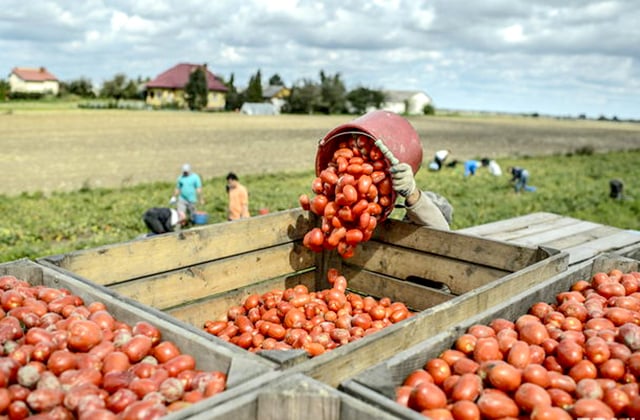“Tomato” Implications of Russia-Turkey Rapprochement

Previously we’ve touched upon the export of Armenian tomatoes. It turned out, that export of tomatoes from Armenia to EEU member countries recorded an incredible growth. Pursuant EEU data 20366 tons of tomatoes have been exported from Armenia to EEU member countries with the customs value of more than USD 14 million. In case, when in 2014 total 217.7 tons of tomatoes have been exported from Armenia, and 1254 tons in 2015. Moreover, 7000 tons of tomatoes have been exported only in April.
RA Ministry of agriculture hurried to introduce clarification regarding this publication. It was stated, that according to the data of National Statistical Service in 2015 sowing areas for tomatoes (open soil) comprised 7401 tons, aggregate volume of the crop—320183 tons, and in 2016, upon operative data, tomato seeding comprised 7900-8000 hectares.
Could export of tomatoes be conditioned by growth of 500-600 hectares? Upon rough calculations—yes. According to the National Statistical Service, crop yield of tomatoes comprises about 446 centners from 1 hectare. Thus, about 26 thousand tons of tomatoes may be obtained a year.
I’m not an agronomist, however, on account of the season, it may be supposed that on a 4-month basis additional yield of tomatoes won’t exceed 9-10 thousand tons. This, surely, is a rough calculation, however, obviously, export of more than 20 thousand tons in 4 months isn’t possible to explain by this only.
For this very reason specialists of the Ministry of Agriculture conditioned that growth mainly with activation of hothouse economy. It’s stated in the clarification that in the period of recent years serious interest is observed among the householders towards construction and reconstruction of hothouses, and modern hothouses allow not only to radically increase crop yield, but also to improve the quality, “As a result of hothouse economy since spring of previous year mainly high-quality local tomato, cucumber, radish, strawberry and different flowers have been sold and their export volumes have sharply increased as well.”
It’s also stated that as of today in exploited economies of Armenia territories of tomatoes, upon operative data, comprise about 475 hectares, from which 434 hectares with ordinary technologies, yield of one square meter varies around 8-20kg, and in 41 hectares of application of modern technologies—around 40-50kg. 97000-100000 tons of tomatoes are produced in hothouses per year. However, it’s not mentioned, how much the territories of tomato in hothouses have increased as compared to previous year.
Thus, let’s accept, that the Ministry of Agriculture grounded growth of export of tomatoes. This means, that a new higher benchmark of tomato export is being enshrined throughout the first four months—more than 20 thousand tons of tomatoes only to the EEU member countries. If in the period of January-April 2016 that benchmark is maintained or will record growth, we may fact, that tomato growing in Armenia really reached new heights and is taking the Eurasian market.
Otherwise it’ll turn out that “evil tongues” are right, when they say that in fact, growth has been recorded on account of Turkish tomatoes, which illegally entered Armenia and was exported to Russia as Armenian tomatoes. By the way, speedy reflection of the Ministry of Agriculture was conditioned by that very intention of removing the Turkish track.
The reader may suppose, if the “Turkish variant” has worked, then it’ll continue working next year as well and indices for the export of tomatoes will be maintained, however, a few interesting facts have emerged.
As already known, Turkey’s president these days apologized for downing the Russian military plane in November 2015 (after which Russia imposed sanctions against Turkey). It wasn’t difficult to anticipate, that the Russian side will soon shake the hand stretched to its side and Russia-Turkey relations again be brotherly. However, events are developing quicker than expected. Vladimir Putin, RF president, and Recep Tayyip Erdogan, president of Turkey, had a phone conversation lasting for 40 minutes. As the press service of the Kremlin informed yesterday, “Russia’s leader stated that he’ll assign the Government to launch negotiations with respective Turkish offices to restore mutual beneficial cooperation in the field of trade, economy and other fields. The first step has already been taken—It was informed that restrictions on visit of Russian tourists to Turkey have been eliminated.
This means soon Russia will eliminate restrictions as well, i.e. Turkish tomato won’t need to pretend as Armenian and will immediately be sent back to Russia. In its turn, this means, if “evil tongues” are right and, in fact, Turkish tomatoes have been exported to Russia, next year export of tomatoes will reduce as much as it grew this year.
The second stage of Russia-Turkey rapprochement will disappoint not only those enthusiastic about worsening of Russia-Turkey relations, but businessmen of tomato “trafficking.”
However, the job of the Ministry of Agriculture will be difficult either, as it’ll be extremely difficult to ground radical decline of export of tomatoes. Moreover, when hothouse economy, according to the Ministry, is not getting passive, but he contrary, new contemporary hothouses are being constructed. If evil tongues are right.
And this curious story of tomatoes, in fact, is not the concern of the Ministry of Agriculture, but is a deeper systemic issue. If people in Armenia consider quite realistic that a few thousand of tons of tomatoes may be imported from Turkey to Armenia, this speaks of zero-level trust towards the customs system.
By Babken Tunyan

























